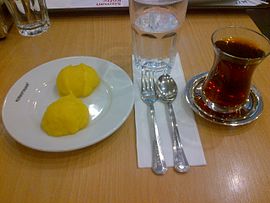This is an old revision of this page, as edited by 94.254.108.147 (talk) at 05:44, 1 January 2024 (Deleted the wrong info.). The present address (URL) is a permanent link to this revision, which may differ significantly from the current revision.
Revision as of 05:44, 1 January 2024 by 94.254.108.147 (talk) (Deleted the wrong info.)(diff) ← Previous revision | Latest revision (diff) | Newer revision → (diff) Flour-based cheese helvah| This article uses bare URLs, which are uninformative and vulnerable to link rot. Please consider converting them to full citations to ensure the article remains verifiable and maintains a consistent citation style. Several templates and tools are available to assist in formatting, such as reFill (documentation) and Citation bot (documentation). (September 2022) (Learn how and when to remove this message) |
 Hoşmerim and Turkish tea Hoşmerim and Turkish tea | |
| Course | Dessert |
|---|---|
| Place of origin | |
| Main ingredients | Semolina, cheese, sugar, milk, almond |
Höşmerim or hoşmerim is a Turkish dessert popular in the Aegean, Marmara, Trakya and Central Anatolia regions of Turkey. It is sometimes called peynir helva or "cheese halva". It is generally consumed after a meal as a light dessert and may be topped with ice cream, honey or nuts.
Höşmerim has been served for 50–55 years as a commercial product in the markets and pastry shops. However, most of its manufacture occurs on a small scale. Recipes and methods may differ from one region to another. Traditional recipes include fresh unsalted cheese, semolina and powdered sugar. Commercially produced höşmerim may include cream, egg and riboflavin in addition to the traditional ingredients for the homemade varieties.
Etymology
According to the folk etymology, a soldier could not see his wife for a long time because of the war. When the war finished, man came to his village and saw his wife. His wife prepared Hoşmerim and asked her husband "Hoş mu erim?" meaning "Is it nice, my man?"
See also
References
This Turkish cuisine-related article is a stub. You can help Misplaced Pages by expanding it. |
This Azerbaijani cuisine-related article is a stub. You can help Misplaced Pages by expanding it. |